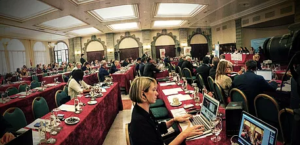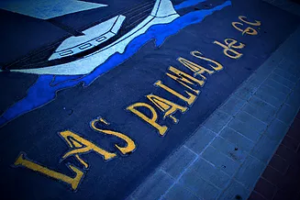An international Adventure: Live-streaming for the LDAC
September 7, 2015
This September the MWC team travelled to Las Palmas in Gran Canaria, to provide comms support at a unique conference event; exploring the external dimension of the Common Fisheries Policy. Read about their experience in this blog by Juliette Tunstall (MWC – Communication Intern).

The reformed Common Fisheries Policy (CFP) is a hot-topic inside (and out) of the fishy-sphere. European fishers, fisheries, NGOs and scientists alike are striving to prepare for the implementation of new EU regulations, including the new maximum sustainable yield (MSY) commitment and the landing obligation. With reformed measures only just beginning to roll out across certain parts of Member States’ fleets, the precise social, economic and environmental impact of the new CFP is yet to be determined, but one thing’s for sure: a sea-change is afoot.
Travel beyond EU waters and one finds that the newly reformed CFP has implications for fisheries further afield, such as those thriving in West African coastal nations. Under new regulations to be termed ‘Sustainable Fisheries Partnership Agreements’ (or ‘SFPAs’) – between West Africa and the EU, many member states’ fleets fish in Africa’s exclusive economic zone. The reformed CFP includes policies that affect these ‘distant’ or ‘third country’ fisheries – policies known as the ‘external dimension’ of the CFP. Thus, the CFP reform signifies major changes for fisheries worldwide!
With this in mind, my colleague Katrina and I made the 2000-mile journey to Las Palmas, Gran Canaria (Spain), to attend the Long Distance Advisory Council’s (LDAC) international conference on the ‘External Dimension of the CFP – Enhancing Cooperation between EU and Africa’, set with the task of ensuring the conference was globally accessible, enabling stakeholders worldwide to join the discussions on the implications of the external dimension of the CFP. It was great for me to finally meet the LDAC team face-to-face after months of email and Skype communication as we supported their event preparations.
The conference brought approximately 150 delegates of 14 nationalities together, including representatives from fisheries organisations, government officials and NGOs. The objective was to produce a set of agreed recommendations to feed into policy around the theme of sustainable social, economic and environmental development in African coastal states (in the context of the external dimension) and how to combat illegal, unreported and unregulated (IUU) fishing.
A prompt start on the first day of the conference was required to in order to do a final visual and sound check of our live-streaming equipment. By 8.30am the conference room in Hotel Santa Catalina was prepped and ready to go, and by 9.30am the delegates were seated, ready for the welcoming statements from Karmenu Vella, Commissioner of Maritime Affairs and Fisheries of the European Union and Isabella Lövin, Minister for International Development Cooperation, Sweden.
The first session of the conference, focused on the CFP from the perspective of policy makers including Stefaan Depypere, Director of International Affairs and Markets, DG MARE, and current Chair of ICCAT, whose presentation explored the opportunities and challenges faced when governing EU fishing in external waters – particularly African waters. Next, Béatrice Gorez (Coordinator of Coalition for Fair Fisheries Agreements – CFFA) moderated an industry-focused panel of expert LDAC stakeholders, including Secretary General of CEPESCA and Europêche President, Javier Garat, and NGO representative Raúl García (WWF Spain) who outlined some practical ways in which EU/African fisheries can find a balance of interests to improve stock management.
As the live stream progressed in English, Spanish and French, Katrina and I summarised the ongoing discussion in bite-sized points for the online audience, to stimulate a live chat forum and allow viewers to ask questions to the panel. The morning session attracted some 52 views through our live-stream feed – taking the total conference presence up to approximately 200! All the live-stream footage we shot was archived, and can be viewed here.
After a Spanish-style late lunch, the delegates were given the opportunity to stretch their legs for a guided tour of the port in Las Palmas (Puerto de Las Palmas). As the largest port in the Canaries, it is a key gateway for commerce between Europe, Africa and America, and is estimated to handle 400,000 tonnes of fish per year. The facilities available at the port make it a hub for international exports and imports. As we coasted through the vessels, containers and repair structures, it stuck me that the sheer magnitude of industrial work going in here was reflected in the magnitude of the task that these delegates were undertaking – to unify the EU and Africa in order to build a sustainable future for fishing. As well as being an informative excursion, the tour was a perfect opportunity to take some pictures of the spectacular array of fishing boats docked in Las Palmas.
The second day of the conference was jam-packed from the off. A selection of panels covered themes from environmental sustainability, combatting IUU fishing, and how to improve fisheries governance. The panel discussions sparked some hot topics for debate amongst the delegates. In between debates Katrina and I worked quickly to film and interview some of the key speakers, to find out their views on the implications of the external dimension, and how the event had been valuable to them and their organisations.. To wrap up the day, Alexandre Rodríguez (LDAC Executive Secretary) and Javier Garat gave the concluding statements, drawing upon points made throughout the conference to produce a set of recommendations to feed in to future policy decisions. The recommendations were broken into two key themes:
 Harmonisation of the conditions of access for foreign fleets to African waters to fish tuna, small pelagic and demersal species, with a view to establishing favourable conditions for fishermen operating responsibly and sustainably.
Harmonisation of the conditions of access for foreign fleets to African waters to fish tuna, small pelagic and demersal species, with a view to establishing favourable conditions for fishermen operating responsibly and sustainably.
Improving scientific knowledge, and quality of data, and promoting the international governance of maritime fishing.
You can view the full set of LDAC recommendations in English, French and Spanish here.
To round off the fantastic event, the LDAC team had organised an evening meal for the delegates at the Port. That evening we joined the international array of stakeholders, to sample some authentic Canary Island food and wine, and be entertained by some talented local musicians.
Over the course of the two-day event the LDAC conference attracted some 215 extra viewers through our live-stream! I couldn’t help but notice how the purpose of our work resonated with one of the key outcomes of the conference; namely, how the advances of technology in recent years was creating a much more traceable and transparent fisheries sector – from the installation of cameras on boats to accurately record catches, to the live streaming of conference events to ensure it’s a globally inclusive event!
If you want to bring new stakeholders to your events and increase transparency in your work via digital live-streaming, get in touch with our MWC #LiveStreamTeam – Katrina Borrow, Katrina@mindfullywired.org, or drop us a tweet: @MWCMarine.
Check out social media posts from the LDAC external dimension conference on @LDAC_EU or #CFPED, or view our Storify here.
